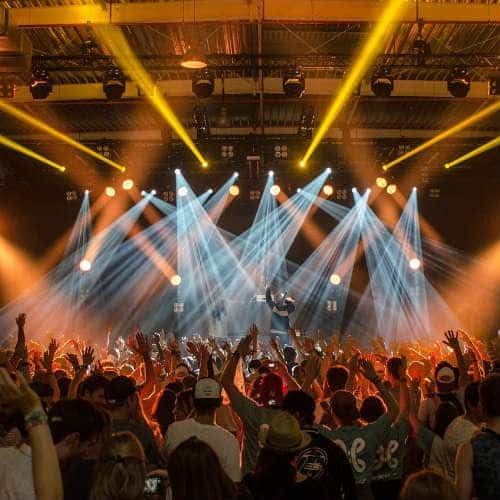You went to a concert in the hopes of having a fun evening and instead you were seriously injured. You likely have many questions, such as:
Our legal team is ready to answer these questions and to review your case. Call our experienced New York concert accident lawyers today to schedule your free consultation or fill out our contact form and we will be in touch shortly.
There are hundreds of concerts held each year in the state of New York and millions of people pay hundreds of dollars to see their favorite artists perform. While the majority of these attendees have a good experience, some leave the concert and head straight to the hospital to be treated for serious injuries, injuries that will not only cause them extreme physical pain but will also prevent them from returning to work and cost them thousands of dollars to treat.
What many concert accident victims don’t realize is that they may be owed significant compensation for the injuries that they sustained and that they only way to obtain that compensation is by filing a concert injury lawsuit.
Often when a client comes to us they are unsure if they have a case because they feel like it may be impossible to identify who was responsible for the accident which caused them harm. It’s normal to feel this way – after all, the majority of concerts have hundreds or even thousands of attendees. But there is a responsible party and with the help of an attorney, a plaintiff can identify all those whose negligence resulted in injury to the innocent.
Our law firm offers free consultations for all concert accident victims and we can help you identify those responsible for your pain. Call now to learn more.

It doesn’t matter how big or small a concert is – without careful preparation and appropriate security, dangerous situations arise that can result in serious injuries. The majority of concert goers are hurt in:
Cracked sidewalks, broken steps, spilled liquids, and loose wiring are just a few examples of the numerous slip and fall hazards that can be found at every concert. Under premise liability laws, venue owners must regularly check the property for these hazards and correct them before any visitors are injured. If they fail to do so, the slip and fall victim can pursue legal action.
The combination of close quarters, alcohol, and different personality types is enough to create a hostile environment where tempers may flare causing fights to break out. It’s not just those involved in the fight that get hurt, often innocent bystanders sustain injuries too.
If this isn’t bad enough, sexual predators often use the poor lighting and loud noise of concerts to conceal their actions. Security measures should be taken to prevent these attacks, but as many of our clients have discovered, venues often fail to provide the proper security.
Each show has its own stage, special effects, lighting, and rigging which is used by the stage crew to move around during the show. If this equipment isn’t set up properly or if a defect is present, an accident can occur.
You might think of a herd of cattle when you hear the phrase stampede but it also applies to a large group of people who is moving forward. These stampedes can be caused by aggression, impatience, or fear and the rest is often the same – victims who are literally crushed and trampled to death by other people.
If you or a loved one were hurt while attending a concert, you are likely suffering both physically and financially due to the expensive medical treatments that you have required. You may feel like you are totally alone and that you will have to climb out of debt on your own, but that may not be the case. Often, those hurt at a concert have the right to pursue legal action against the party responsible and through a lawsuit, recover the compensation that they need to get back on their feet.
When a client comes to us, they want to know that their losses will be fully covered. While we can’t provide you with an exact number, we can assure you that any settlement or reward obtained through the lawsuit will be designed to cover the past and future losses that you have sustained.
At minimum a concert accident lawsuit will take several months to reach its conclusion, however, it’s not uncommon for a lawsuit to take more than a year. This is because building a strong case takes time. Take into consideration the steps that need to be taken during the legal process:
Choosing an attorney and law firm to work with is a deeply personal choice and it’s important for a plaintiff to feel confident in their decision. At Banville Law, we encourage you to “shop around” and speak with several law firms prior to making your decision.
Once you select an attorney, they will help you fill out your paperwork and file the “pleadings”. This is the initial paperwork that is submitted to the court and it gives information on the plaintiff’s case and why they are filing against the defendant.
The court will then issue a summons that informs the defendant that they are being sued and will provide them with a set period of time during which they should issue an “answer” to the complaint. If they fail to issue an answer they will be considered in default.
The discovery portion of a lawsuit is the time during which the plaintiff’s legal team will collect evidence and establish the facts of the case.
Often concert accident lawsuits end with an agreement to settle. This means that both parties have set the terms of the compensation that will be paid to the plaintiff for their losses. Many defendants choose to settle because it will save everyone involved time and money but frequently, the initial offer that is made is simply not an appropriate one. The plaintiff’s legal team can negotiate for the correct amount.
If those involved can’t reach a settlement agreement, the case will go to trial where all arguments will be presented to a judge and jury. This might seem scary but your legal team will prepare you for the courtroom experience.
If you work with Banville Law we will be by your side every step of the way and our legal team will do their best to handle the majority of the legal work so that you can use your time and energy healing.
The attorneys at Banville Law understand that when a client comes to them, they are already suffering financially and are often hesitant to contact an attorney because of the anticipated cost. That’s why we work on a contingency fee. This means that our fee comes directly out of the compensation that we win for you. If we don’t win, we don’t get paid.
Contact our law firm today to learn more.
If you'd like to continue reading about other types of personal injury accidents, visit: https://banvillelaw.com/cruise-ship-accident/
